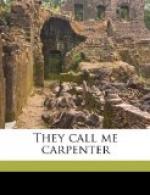Said he: “You talk about mobs—listen to this.” Then, to one of the group about him: “Tell how they mobbed you!” The man thus addressed, a little Russian tailor named Korwsky, narrated in his halting English that he was the secretary of the tailors’ union, and they had a strike, and a few days ago their offices had been raided at night, the door “jimmed” open and the desk rifled of all the papers and records. Evidently it had been done by the bosses or their agents, for nothing had been taken but papers which would be of use against the strike. “Dey got our members’ list,” said Korwsky. “Dey send people to frighten ’em back to verk! Dey call loans, dey git girls fired from stores if dey got jobs—dey hound ’em every way!”
The speaker went on to declare that no such job could have been pulled off without the police knowing; yet they made no move to arrest the criminals. His voice trembled with indignation; and Carpenter turned to me.
“You have mobs that come at night, with dark lanterns and burglars’ tools!”
I had noticed among the men talking to Carpenter one who bore a striking resemblance to him. He was tall and not too well nourished; but instead of the prophet’s robes of white and amethyst, he wore the clothes of a working-man, a little too short in the sleeves; and where Carpenter had a soft and silky brown beard, this man had a skinny Adam’s apple that worked up and down. He was something of an agitator, I judged, and he appeared to have a religious streak. “I am a Christian,” I heard him say; “but one of the kind that speak out against injustice. And I can show you Bible texts for it,” he insisted. “I can prove it by the word of God.”
This man’s name was James, and I learned that he was one of the striking carpenters. The prophet turned to him, and said: “Tell him your story.” So the other took from his pocket a greasy note-book, and produced a newspaper clipping, quoting an injunction which Judge Wollcott had issued against his union. “Read that,” said he; but I answered that I knew about it. I remember hearing my uncle laughing over the matter at the dinner-table, saying that “Bobbie” Wollcott had forbidden the strikers to do everything but sit on air and walk on water. And now I got another view of “Bobbie,” this time from a prophet fresh from God. Said the prophet: “Your judges are mobs!”
XXVIII
Soon after the noon-hour, there pushed his way into the crowd a young man, whom I recognized as one of the secretaries of T-S. He was looking for me, and told me in a whisper that his employer was downstairs in his car, and wanted to see Mr. Carpenter and myself about something important. He did not want to come up, because it was too conspicuous. Would we come down and take a little drive? I answered that I should be willing, but I knew Carpenter would not—he had been in an automobile accident the night before, and had refused to ride again.




